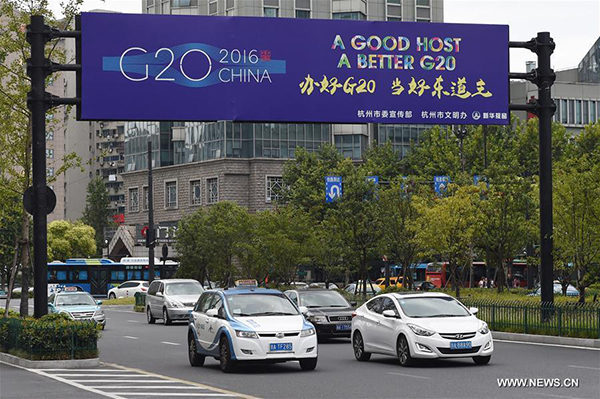 |
|
Cars move on a street in Hangzhou, capital of East China's Zhejiang province, Aug 27, 2016. The 11th G20 summit will be held from Sept 4 to 5 in Hangzhou. [Photo/Xinhua] |
The G20 summit in Hangzhou, East China's Zhejiang province, offers a unique opportunity to world leaders to discuss and decide on a coordinated strategy to address the multiple challenges facing the world, such as the projected decline of world GDP growth to below the long-term average, slowing down of global trade and dwindling investment flows.
Given that economic and geopolitical headwinds are shaking their economies and regions, G20 leaders need to cooperate more than ever to ensure sustainable growth. As G20 chair for this year, China has done a remarkable job in preparing for the Hangzhou summit.
In recent years, China has evolved from being an "innovation sponge"-absorbing and adapting existing technologies and knowledge from around the world-to a global innovation leader in areas such as consumer electronics, high-speed railways, space technology and construction equipment. The country spends more than $200 billion per year on research, second only to the United States, produces close to 30,000 doctoral students in science and engineering, and leads the world in patent applications (1.1 million last year).
The Hangzhou summit is likely to be a turning point for the shift in the G20's focus from designing standards for global financial crisis to responding to future risks for sustainable growth when and where they emerge. And with the G20 being on track to deliver on its previous promise to address the economic fundamentals, this is the right time to modernize the global rules on governance of "inclusion, innovation, invigoration and interconnectedness".
China, on its part, needs to bring its grit to the G20 if it wants to shake off the sluggish growth and help the world move toward sustainable growth by unleashing the potentials of the four "I"s to create more opportunities for the world. In fact, the theme for the Hangzhou G20 summit is "Toward an Innovative, Invigorated, Interconnected and Inclusive World Economy".
Since the global community has agreed to achieve the UN Sustainable Development Goals by 2030, the world economy is expected to enter a key stage of inclusive and interconnected growth this year.
As an African proverb goes, "if you want to go fast, go alone; if you want to go far, go together". For the sustainable future of the world, both developed and developing countries should participate in global governance in the spirit of the Hangzhou summit's theme. Following China's experiences and think tanks' suggestions, the G20 should promote a public-private partnership model to facilitate innovations, including a public-private capital pool to increase productivity.
Besides, China's economic reforms are of great importance to comprehensive macro-finance, which the G20 can use as reference to create a common global framework to integrate global finance and the real economy.
To increase long-term investment, the G20 governance system should be expanded to include international financial institutions, in order to close the gap in infrastructure funding for regional projects to improve connectivity.
Moreover, an inclusive strategy will help boost growth in the G20 economies that have been suffering from economic slowdown, because such a strategy will stabilize public finance that safeguards employment and social welfare while encouraging productive investments.
Previous summits have offered important lessons for organizing G20 meetings. That China has worked out the best agenda for the Hangzhou summit suggests it has taken these lessons very seriously. And by leading the efforts to meet the global challenges, as evident in its summit's theme, China can make a huge contribution to economic, social and environmental prosperity of all.
The author is a senior economist at the Economic Research Institute for ASEAN and East Asia, Indonesia.